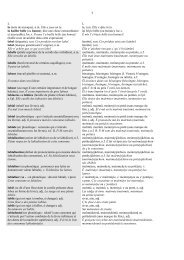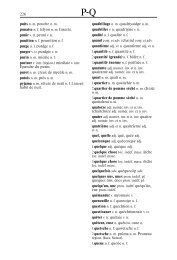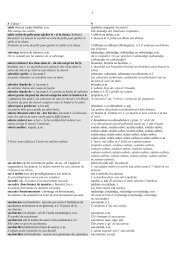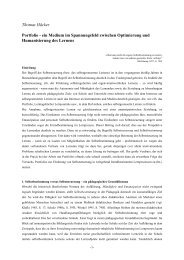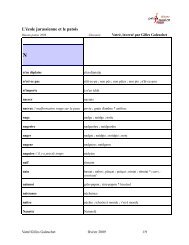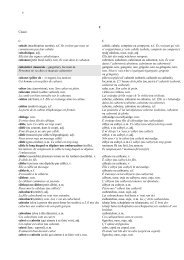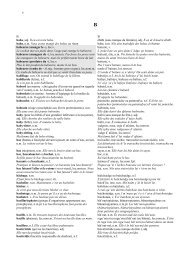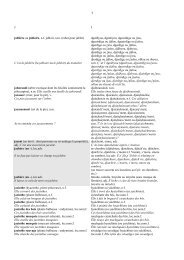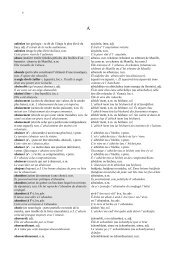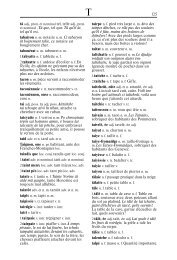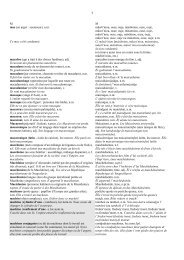R Classé ! R ra (onomatopée : coup de baguette ... - Image du Jura
R Classé ! R ra (onomatopée : coup de baguette ... - Image du Jura
R Classé ! R ra (onomatopée : coup de baguette ... - Image du Jura
You also want an ePaper? Increase the reach of your titles
YUMPU automatically turns print PDFs into web optimized ePapers that Google loves.
affiner (rechercher la délicatesse ou la subtilité la<br />
plus g<strong>ra</strong>n<strong>de</strong>), v. Pourquoi vouloir toujours <strong>ra</strong>ffiner?<br />
<strong>ra</strong>ffiner (se - ; se purifier, être <strong>ra</strong>ffiné), v.pron.<br />
Le sucre se <strong>ra</strong>ffine avec le noir animal.<br />
<strong>ra</strong>ffiner (se - ; <strong>de</strong>venir plus fin, moins frustre), v.pron.<br />
Ce jeune homme a besoin <strong>de</strong> se <strong>ra</strong>ffiner.<br />
<strong>ra</strong>ffinerie (usine où s’effectue le <strong>ra</strong>ffinage), n.f.<br />
Elle t<strong>ra</strong>vaille dans une <strong>ra</strong>ffinerie.<br />
<strong>ra</strong>ffineur (personne qui exploite, dirige une<br />
<strong>ra</strong>ffinerie), n.m. Ils ont engagé un nouveau <strong>ra</strong>ffineur.<br />
<strong>ra</strong>ffineur (en papeterie : appareil utilisé pour le<br />
<strong>ra</strong>ffinage <strong>de</strong> la pâte à papier), n.m. La pile est le plus<br />
connu et le plus répan<strong>du</strong> <strong>de</strong>s <strong>ra</strong>ffineurs utilisés à ce<br />
jour.<br />
<strong>ra</strong>ffineuse (pile - ; en papeterie : système pour<br />
effectuer le <strong>ra</strong>ffinage <strong>de</strong> la pâte à papier), loc.nom.f.<br />
La pâte à papier ressort <strong>coup</strong>ée, fibrillée <strong>de</strong> la pile<br />
<strong>ra</strong>ffineuse.<br />
<strong>ra</strong>fiau ou <strong>ra</strong>fiot (petite embarcation méditer<strong>ra</strong>néenne<br />
à une voile e à <strong>ra</strong>mes), n.m. Il t<strong>ra</strong>verse le port en<br />
<strong>ra</strong>fiau (ou <strong>ra</strong>fiot).<br />
<strong>ra</strong>fiau ou <strong>ra</strong>fiot (mauvais bateau), n.m.<br />
Elle est partie sur son <strong>ra</strong>fiau (ou <strong>ra</strong>fiot).<br />
<strong>ra</strong>fistolage (mauvais -), loc.nom.m.<br />
Quel mauvais <strong>ra</strong>fistolage! Ce n’est pas <strong>du</strong> t<strong>ra</strong>vail.<br />
<strong>ra</strong>fistolage (mauvais -), loc.nom.m.<br />
Cela ne se<strong>ra</strong> jamais que <strong>du</strong> mauvais <strong>ra</strong>fistolage.<br />
<strong>ra</strong>fistoler (mal -), loc.v.<br />
Il a mal <strong>ra</strong>fistolé ce meuble.<br />
<strong>ra</strong>fistoleur (mauvais -), loc.nom.m.<br />
Tu as bien fait <strong>de</strong> ne pas payer ce mauvais <strong>ra</strong>fistoleur.<br />
<strong>ra</strong>ge mue (sorte <strong>de</strong> <strong>ra</strong>ge pendant laquelle le chien<br />
affecté n’aboie pas), loc.nom.f. On a abattu ce chien<br />
qui était atteint d’une <strong>ra</strong>ge mue.<br />
<strong>ra</strong>geuse (personne -), loc.nom.f.<br />
J’igno<strong>ra</strong>is que c’était une telle personne <strong>ra</strong>geuse.<br />
<strong>ra</strong>gondin (petit mammifère rongeur qui vit dans les<br />
cours d’eau), n.m. Un <strong>ra</strong>gondin t<strong>ra</strong>verse le canal.<br />
<strong>ra</strong>gondin (fourrure très estimée <strong>du</strong> <strong>ra</strong>gondin), n.m.<br />
Son manteau est en <strong>ra</strong>gondin.<br />
<strong>ra</strong>got (pour une personne : petit et gros), adj.<br />
« Le cont<strong>ra</strong>ste d’un jeune corps <strong>du</strong>r, mal équarri et<br />
d’un sé<strong>ra</strong>phique visage…, Vierge <strong>de</strong> Raphaël qui eût<br />
été <strong>ra</strong>gote » (F<strong>ra</strong>nçois Mauriac)<br />
<strong>ra</strong>g s’ ot (personne petite et grosse), n.f.<br />
Ce <strong>ra</strong>got est plus fort que chacun <strong>de</strong> nous.<br />
<strong>ra</strong>got (personne qui colporte <strong>de</strong>s -), loc.nom.f.<br />
Elle a cloué le bec à cette personne qui colporte <strong>de</strong>s<br />
<strong>ra</strong>gots.<br />
10<br />
<strong>ra</strong>iffinaie ou <strong>ra</strong>iffïnnaie, v.<br />
Poquoi v’lait aidé <strong>ra</strong>iffinaie (ou <strong>ra</strong>iffïnnaie)?<br />
s’ <strong>ra</strong>iffinaie ou s’ <strong>ra</strong>iffïnnaie, v.pron.<br />
L’ socre se <strong>ra</strong>iffine (ou <strong>ra</strong>iffïnne) daivô l’ainimâ noi.<br />
s’ <strong>ra</strong>iffinaie ou s’ <strong>ra</strong>iffïnnaie, v.pron.<br />
Ci djûene hanne é fâte d’ se <strong>ra</strong>iffinaie (ou <strong>ra</strong>iffïnnaie).<br />
<strong>ra</strong>iffin’rie ou <strong>ra</strong>iffïnn’rie, n.f.<br />
Èlle t<strong>ra</strong>ivaiye dains ènne <strong>ra</strong>iffin’rie (ou <strong>ra</strong>iffïnn’rie).<br />
<strong>ra</strong>iffinou, ouse, ouje ou <strong>ra</strong>iffïnnou, ouse, ouje, n.m.<br />
Èls aint engaidgie ïn nové <strong>ra</strong>iffinou (ou <strong>ra</strong>iffïnnou).<br />
<strong>ra</strong>iffinou, ouse, ouje ou <strong>ra</strong>iffïnnou, ouse, ouje, n.m.<br />
Lai pile ât l’pus coégnu pe l’ pus répaîju <strong>de</strong>s <strong>ra</strong>iffinous (ou<br />
<strong>ra</strong>iffïnnous) yutilijès en ci djoué.<br />
<strong>ra</strong>iffinouje (<strong>ra</strong>iffinouse, <strong>ra</strong>iffïnnouje ou <strong>ra</strong>iffïnnouse) pile (ou<br />
piye), loc.nom.f.<br />
Lai paîte è paipie eur’soûe copèe, bridjattèe d’ lai <strong>ra</strong>iffinouje<br />
(<strong>ra</strong>iffinouse, <strong>ra</strong>iffïnnouje ou <strong>ra</strong>iffïnnouse) pile (ou piye).<br />
<strong>ra</strong>ifiat, n.m.<br />
È t<strong>ra</strong>ivoiche le port en <strong>ra</strong>ifiat.<br />
<strong>ra</strong>ifiat, n.m.<br />
Èlle ât paitchi chus son <strong>ra</strong>ifiat.<br />
aidjoquaidge, aidjotçhaidge, empoulaidge, encapoulaidge ou<br />
tchétron, n.m. Qué l’ aidjoquaidge (l’ aidjotçhaidge,<br />
l’ empoulaidge, l’ encapoulaidge ou tchétron)! Ç’ n’ ât p’ di<br />
t<strong>ra</strong>ivaiye.<br />
r’tchét<strong>ra</strong>idge, rtchét<strong>ra</strong>idge, r’tchétron ou rtchétron, n.m.<br />
Çoli n’ veut dj’mais étre que di r’tchét<strong>ra</strong>idge (rtchét<strong>ra</strong>idge,<br />
r’tchétron ou rtchétron).<br />
(on trouve aussi tous ces noms sous la forme : eur’tchét<strong>ra</strong>idge,<br />
etc.)<br />
eur’tchét<strong>ra</strong>ie, eurtchét<strong>ra</strong>ie, r’tchét<strong>ra</strong>ie ou rtchét<strong>ra</strong>ie, v.<br />
Èl é eur’tchétrè (eurtchétrè, r’tchétrè ou rtchétrè) ci moubye.<br />
eur’tchétrou, ouse, ouje, eurtchétrou, ouse, ouje,<br />
r’tchétrou, ouse, ouje, rtchétrou, ouse, ouje<br />
ou tchétrou, ouse, ouje, n.m. T’ és bïn fait <strong>de</strong> n’ pe paiyie<br />
c’t’ eur’tchétrou (ç’t’ eurtchétrou, ci r’tchétrou, ci rtchétrou ou ci<br />
tchétrou).<br />
mue (ou mve) <strong>ra</strong>idge, loc.nom.f.<br />
An ont aibaittu ci tchïn qu’ était touétchi poi ènne mue (ou mve)<br />
<strong>ra</strong>idge.<br />
<strong>ra</strong>idge â coûe (ou coue), loc.nom.f.<br />
I n’ saivôs p’ qu’ c’était ènne tâ <strong>ra</strong>idge â coûe (ou coue).<br />
<strong>ra</strong>igondïn, n.m.<br />
Ïn <strong>ra</strong>igondïn t<strong>ra</strong>ivoiche le cainâ.<br />
<strong>ra</strong>igondïn, n.m.<br />
Son mainté ât en <strong>ra</strong>igondïn.<br />
<strong>ra</strong>igâ, âte, <strong>ra</strong>igat, ate, <strong>ra</strong>igot, ote, règat, ate, règot, ote, rigat, ate<br />
ou rigot, ote, adj. « L’ cout<strong>ra</strong>ichte d’ ïn djûene dieut coûe, mâ<br />
équairri pe d’ ïn ché<strong>ra</strong>iphïn vésaidje…, Vierdge d’ ci Raphaël qu’<br />
feut aivu <strong>ra</strong>igâte (<strong>ra</strong>igate, <strong>ra</strong>igote, règate, règote, rigate ou<br />
rigote) »<br />
<strong>ra</strong>igâ, âte, <strong>ra</strong>igat, ate, <strong>ra</strong>igot, ote, règat, ate, règot, ote, rigat, ate<br />
ou rigot, ote, n.m. Ci <strong>ra</strong>igâ (<strong>ra</strong>igat, <strong>ra</strong>igot, règat, règot, rigat ou<br />
rigot) ât pus foûe qu’ tchétçhun d’ nôs.<br />
<strong>ra</strong>igatou, ouse, ouje, <strong>ra</strong>igotou, ouse, ouje, règatou, ouse, ouje,<br />
règotou, ouse, ouje, rigatou, ouse, ouje ou rigotou, ouse, ouje,<br />
n.m. Èlle é çhoûe l’ bac en ci <strong>ra</strong>igatou (<strong>ra</strong>igotou, règatou,<br />
règotou, rigatou ou rigotou).



